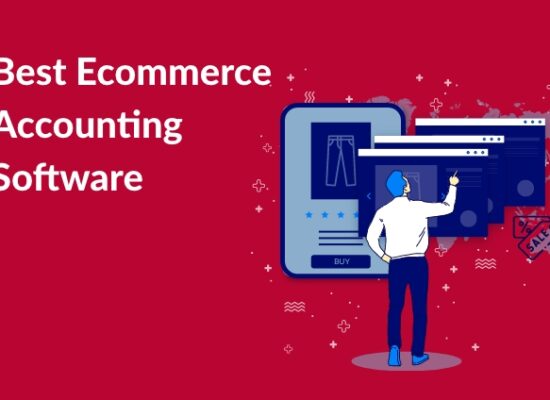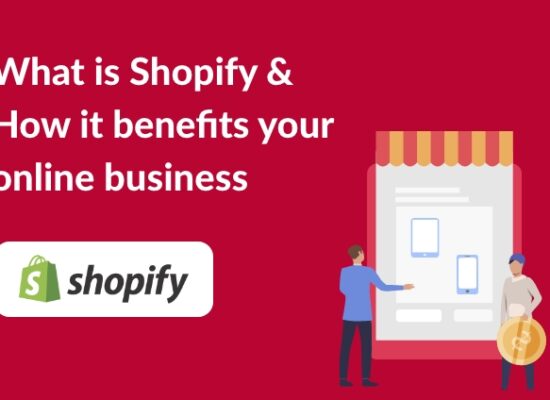Transforming clicks into loyal customers and transactions into relationships, the heartbeat of eCommerce lies in effective customer relationship management. In the dynamic marketplace where every interaction counts, finding the perfect CRM software is the digital compass guiding your online success story.
CRM (customer relationship management) software is essential to optimizing e-commerce operations by increasing customer satisfaction, boosting sales, and raising retention rates. CRM also makes it easier to communicate through various media, guaranteeing consistency in messaging and building closer bonds with clients.
Furthermore, it facilitates consumer segmentation, loyalty programs, and targeted marketing campaigns, eventually leading to higher customer satisfaction and loyalty. CRM software is a potent instrument that helps e-commerce companies comprehend and keep consumers, which promotes revenue growth and long-term success.
Top 9 CRM Software Solutions for Ecommerce
1. Zoho CRM
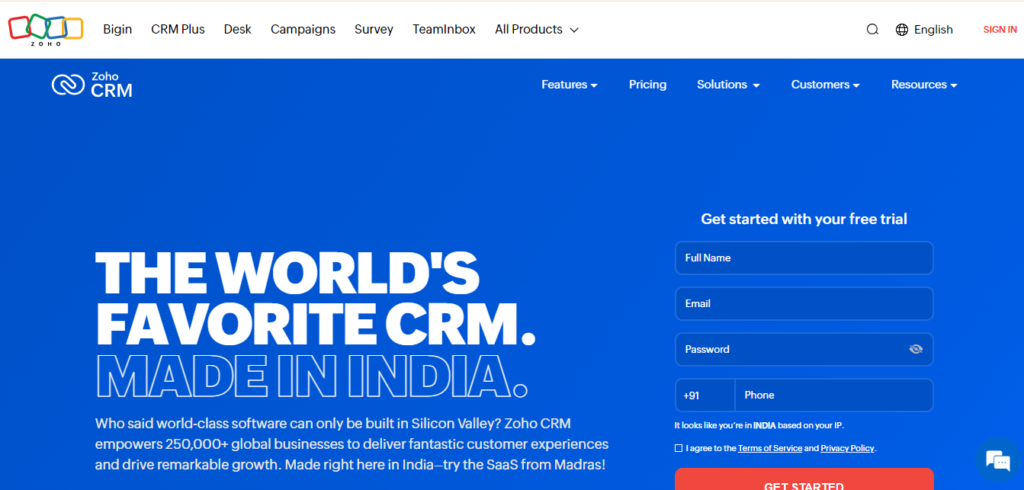
Key Features
- Client Data Management: Zoho CRM offers a thorough picture of every customer’s journey by centralizing client information, including preferences, past purchases, and interactions.
- Integration Capabilities: Zoho CRM’s easy integration with well-known e-commerce platforms like Shopify, WooCommerce, and Magento facilitates data synchronization and workflow automation.
- Sales Automation: Zoho sales automation solutions help e-commerce companies grow profitably by streamlining the sales process from lead generation to conversion.
- Analytics and Reporting: With Zoho CRM’s powerful analytics and reporting tools, e-commerce companies can monitor sales performance, examine patterns, and make informed decisions.
- Multichannel Support: Zoho CRM allows e-commerce companies to interact with customers through various channels, improving communication and increasing sales. These channels include social media, email, live chat, and more.
Pros and cons
| pros | Cons |
| Zoho CRM is highly customizable, enabling it to be tailored to the specific requirements of e-commerce enterprises. | Zoho CRM could have a higher learning curve for users who need to become more familiar with CRM software. |
| Time may be saved, and productivity increased by automating monotonous processes like email marketing and lead management. | Although Zoho CRM has various pricing options, certain features might only be accessible in the more expensive plans. |
| It works flawlessly with third-party e-commerce systems like Shopify, WooCommerce and other Zoho apps. | Due to its considerable customisation capabilities, the software might be complex and even intimidating for small firms without specialized IT help. |
| It can grow with your company, supporting additional users and data without sacrificing functionality. | Even though Zoho interfaces with a wide range of well-known e-commerce platforms, companies using unique or uncommon systems may encounter integration difficulties. |
| Zoho CRM offers insightful analytics and reporting tools to monitor customer behaviour and sales performance. | Compared to specific other CRM solutions, Zoho’s customer service may not be as extensive or easily accessible. |
Pricing and Plans
| Standard | $14 per user per month |
| Professional | $23 per user per month |
| Enterprise | $40 per user per month |
| Ultimate | $52 per user per month |
Read More: Ecommerce Marketing Strategies that Drive Results
2. HubSpot CRM
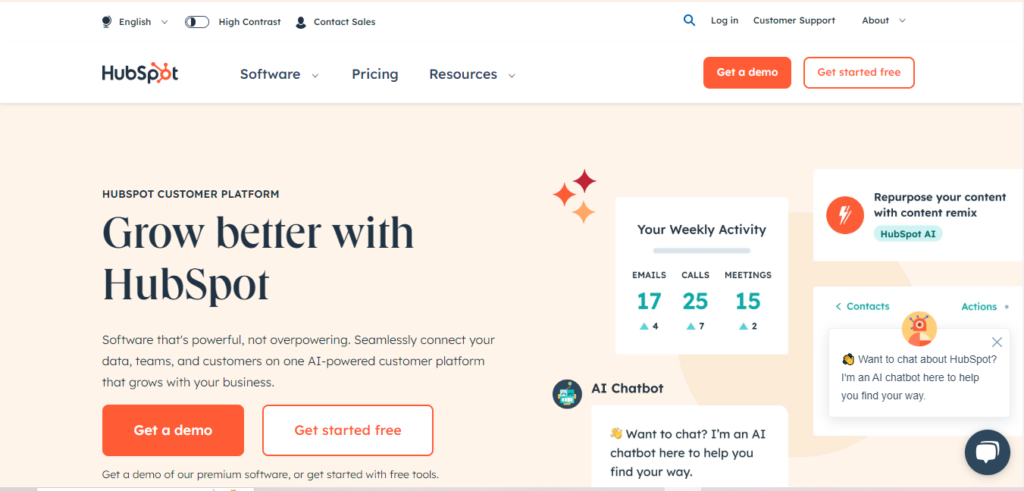
Key Features
- Unified Customer View: HubSpot CRM compiles customer information from several channels to comprehensively understand every customer’s interactions and past purchases.
- Sales Automation: HubSpot automation tools simplify lead management and order processing, freeing up e-commerce personnel to concentrate on high-value tasks.
- Marketing Automation: HubSpot’s marketing automation solutions help e-commerce companies customize marketing campaigns, target specific demographics, and move leads through the sales funnel.
- Ecommerce Integration: HubSpot easily interacts with popular e-commerce platforms such as BigCommerce, Magento, and Shopify, allowing for automated processes and easy data synchronization.
- Customer Support Tools: Ticketing systems and live chat are just some of the customer support tools that HubSpot CRM offers. These tools help e-commerce companies improve customer satisfaction and post-purchase assistance.
Pros and cons
| Pros | Cons |
| HubSpot’s user-friendly interface makes it simple for users to get started and use its capabilities without much training. | Although HubSpot provides a free CRM alternative, premium solutions with more features and functionality can be expensive. |
| Robust marketing automation features offered by HubSpot CRM allow for individualized consumer communication throughout the e-commerce process. | Although the UI is easy to use, more experienced users find the absence of customization possibilities constraining. |
| It simplifies procedures and data administration by easily integrating various e-commerce platforms and applications. | HubSpot could offer fewer customization options than other CRM programs, which could disadvantage companies with particular needs. |
| HubSpot offers first-rate customer service, training materials, copious documentation, and a helpful community. | Although HubSpot CRM works well for small to medium-sized e-commerce companies, it might not be scalable enough for larger organizations with more complicated requirements. |
| Organizations can monitor their marketing efforts, customer interactions, and sales performance with its extensive reporting and analytics options. | Enterprises with significant investments in the HubSpot ecosystem could encounter difficulties when integrating with non-HubSpot technologies or platforms. |
Pricing and Plans
| Starter | $15 per month |
| Professional | $800 per month |
| Enterprise | $3,600 per month |
Read More: 7 Best Ecommerce Automation Tools
3. Monday CRM
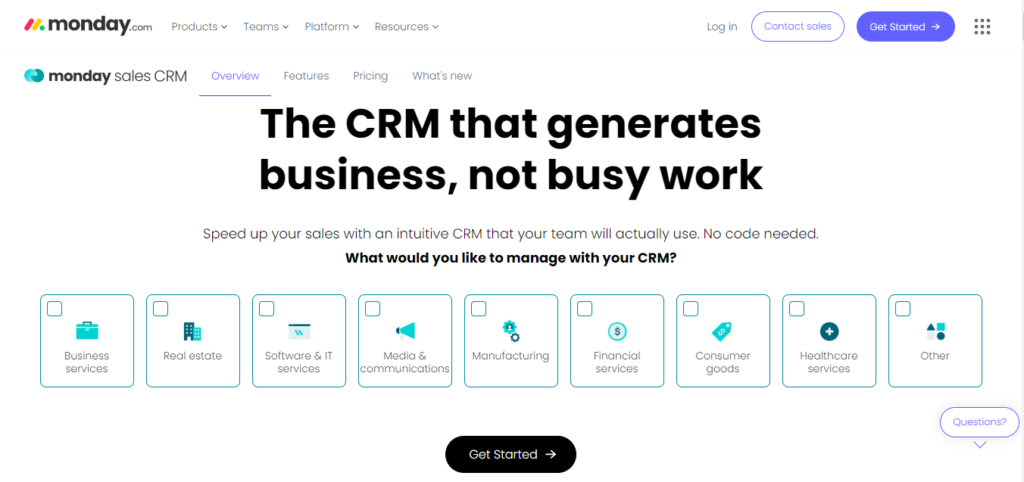
Key Features
- Customizable Workflows: Monday CRM lets you design unique workflows for your e-commerce operations, such as order processing, inventory monitoring, and customer service ticketing.
- Visual Project Management: Monday CRM’s visual project management interface facilitates clear and transparent communication amongst teams by making it simple to monitor tasks, due dates, and milestones pertaining to e-commerce operations.
- Collaboration Tools: Whether managing product launches, organizing marketing campaigns, or responding to consumer inquiries, ecommerce teams can collaborate effectively with Monday CRM collaboration tools.
- Integration Capabilities: Monday CRM interacts with several e-commerce platforms and tools, including Shopify, WooCommerce, and Zapier, to allow for automation and data synchronization.
- Customizable Dashboards: Monday CRM allows you to create customizable dashboards with widgets and reports to monitor key metrics relevant to your ecommerce business, such as sales performance, inventory levels, and customer feedback.
Pros and cons
| Pros | Cons |
| Monday CRM offers a high degree of customization, allowing companies to design workflows specifically suited to their e-commerce CRM requirements. | Although Monday CRM has CRM capability, its usefulness for intricate CRM requirements may be limited by the absence of some sophisticated features compared to specialized CRM solutions. |
| Teams may collaborate easily on CRM tasks and projects with Monday CRM’s powerful collaboration features. | Monday CRM could be difficult for larger teams or businesses with significant CRM needs. |
| Its aesthetically pleasing design improves user experience by making it simple for people to comprehend and interact with data. | Users who are not familiar with the platform may find the various customization choices more challenging, necessitating onboarding and training. |
| Monday CRM is affordable for organizations of all sizes because of its customizable price levels. | Monday CRM can expand with businesses, but it might not provide the same degree of scalability and specialized CRM features. |
| It connects with various e-commerce platforms and applications, allowing companies to centralize data and simplify workflows. | Companies that depend significantly on integrations can encounter difficulties when Monday CRM does not offer integration choices with particular e-commerce platforms or technologies. |
Pricing and Plans
| Basic CRM | $12 seat per month |
| Standard CRM | $17 seat per month |
| Pro CRM | $28 seat per month |
Read More: 8 Key Software Tools for Ecommerce Operations
4. Freshsales

Key Features
- Contact Management: Lead scoring, segmentation, and tailored communication are just a few of the ways that Freshsales assists e-commerce companies in managing and organizing their customer connections.
- Email Campaigns and Tracking: Ecommerce companies can design focused email campaigns, monitor engagement metrics, and enhance email performance using Freshsales integrated email campaign management and tracking tools.
- Pipeline Management: Businesses can track deals, automate follow-ups, and correctly anticipate sales using Freshsales’ user-friendly pipeline management tools designed for online sales processes.
- Lead Scoring and Qualification: The CRM platform’s lead scoring features enable e-commerce companies to rank leads according to how likely they are to convert, assisting sales teams in concentrating on high-value prospects.
- Integration Ecosystem: Data synchronization and workflow automation are made easier with Freshsales’ smooth integration with well-known e-commerce platforms, marketing automation tools, and other corporate applications.
Pros and cons
| Pros | Cons |
| Ecommerce specific capabilities offered by Freshsales include lead scoring based on online activity, cross-channel tracking of consumer interactions, and interface with well-known e-commerce platforms. | Although Freshsales has some basic marketing automation features, it is not as feature-rich as platforms that specialize in marketing automation. |
| Automating routine processes such as sending follow-up emails, updating client information, and allocating tasks to team members is made easier with Freshsales’ automation capabilities. | Despite having an intuitive interface, new users may still need to go through a learning curve, particularly if they are not experienced with CRM software. |
| It has an intuitive user interface that makes managing client connections and sales pipelines easier for sales teams. | A few individuals have left mixed reviews of Freshsales’ customer service, pointing out slow response times and troubleshooting technical problems. |
| Businesses can customize the CRM using Freshsales to meet their unique requirements including custom fields, processes, and reporting. | Freshsales might not provide the same degree of scalability and functionality needed by larger organizations with intricate sales procedures. |
| It allows for a more unified workflow by integrating with a variety of e-commerce platforms, marketing tools, and other company apps with ease. | Despite providing a free plan and offering fair pricing for its subscription plans, some firms could find the costs too high. |
Pricing and Plans
| Basic | $9 per month |
| Pro | $39 per month |
| Enterprise | $59 per month |
5. EngageBay
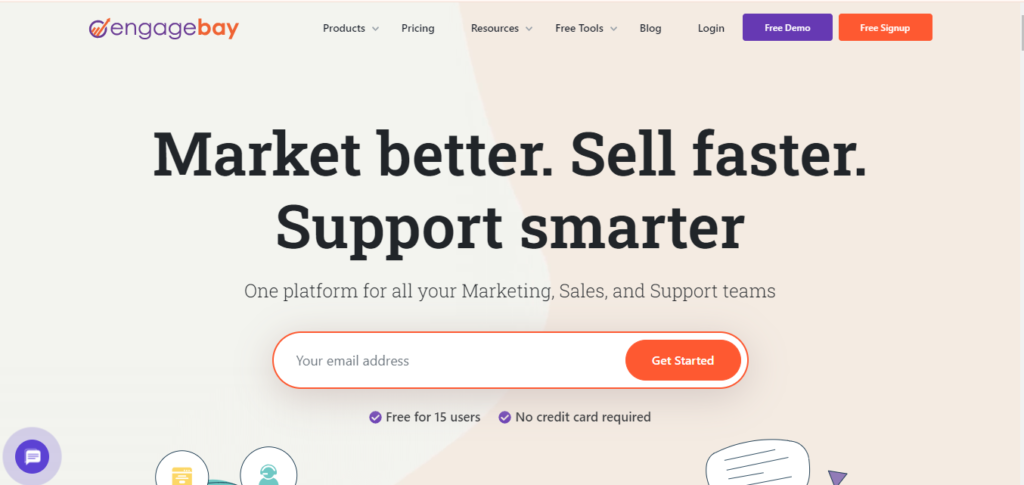
Key Features
- Marketing Automation: With EngageBay’s powerful marketing automation capabilities, e-commerce companies can design and automate customized marketing programs such as social media, email, and lead nurturing campaigns.
- Ecommerce Integration: Businesses can manage orders, automate sales processes, and sync customer data with EngageBay by integrating it effortlessly with well-known ecommerce systems like Shopify, WooCommerce, and Magento.
- Sales Automation: Streamlining and increasing productivity, the CRM platform offers sales automation capabilities like lead scoring, contact segmentation, and workflow automation.
- Analytics and Reporting: With EngageBay’s strong analytics and reporting features, e-commerce companies can monitor important indicators, examine consumer behaviour, and get knowledge to improve their marketing and sales tactics.
- Customer Support Tools: EngageBay helps e-commerce companies give prompt, individualized customer care by providing tools like live chat, ticketing systems, and knowledge base management.
Pros and cons
| Pros | Cons |
| With the help of EngageBay’s tool package, which includes customer care, marketing automation, and CRM, e-commerce companies can handle every facet of their client connections on a single platform. | Even with its user-friendly interface, new users may still need to undergo a learning curve, especially if they are not experienced with marketing automation solutions. |
| EngageBay provides powerful marketing automation capabilities to engage customers throughout the e-commerce process, including email marketing, lead nurturing, and customized campaigns. | EngageBay may not provide the same degree of scalability and functionality needed by larger companies with intricate sales and marketing procedures. |
| It readily interfaces with well-known e-commerce systems like Magento, WooCommerce, and Shopify, allowing companies to automate sales processes and synchronize client data. | Although EngageBay has a wide range of functionality, it might not have all of the features available in more specialized marketing automation or CRM platforms. |
| EngageBay is available to companies of all sizes and has attractive pricing levels, including a free option for startups and small businesses. | Given that EngageBay is a relatively recent CRM entrant, questions about the platform’s sustainability and continued growth may arise. |
| Businesses can customize the CRM to meet their unique needs due to its broad customization capabilities, which include custom fields, pipelines, and workflows. | A few individuals have expressed conflicting opinions about EngageBay’s customer service, pointing to slow response times. |
Pricing and Plans
| Basic | $14.99 per month |
| Growth | $49.99 per month |
| Pro | $79.99 per month |
6. Nutshell
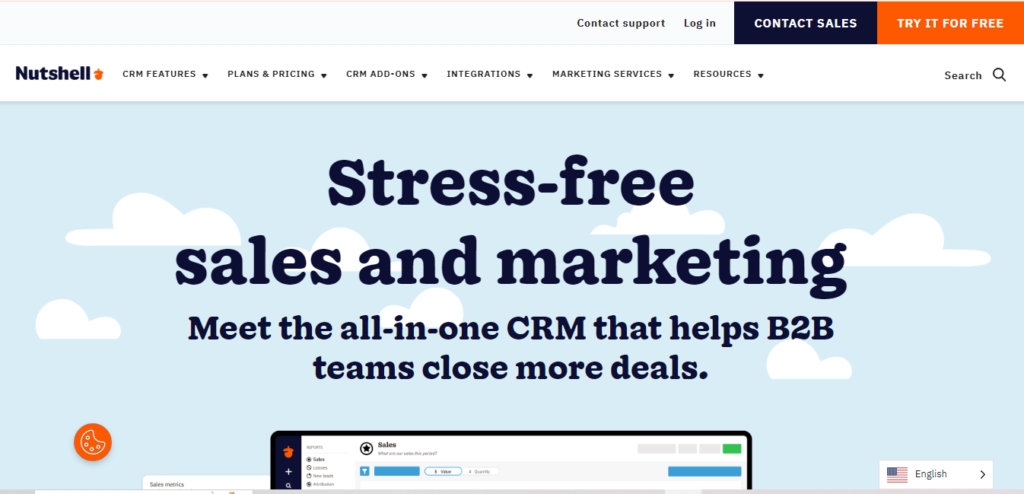
Key Features
- Contact and Lead Management: With lead scoring, segmentation, and activity monitoring, Nutshell helps e-commerce companies efficiently arrange and manage their consumer contacts and leads.
- Ecommerce Integration: Businesses can track orders, automate sales processes, and sync customer data using Nutshell’s easy integration with well-known ecommerce systems like Shopify, WooCommerce, and BigCommerce.
- Sales Pipeline Management: Nutshell’s user-friendly pipeline management solutions, tailored for online sales operations, allow businesses to track deals, automate follow-ups, and properly anticipate sales.
- Customizable Reporting: With Nutshell’s customizable reporting features, e-commerce companies may monitor important KPIs, analyze sales performance, and generate insights to optimize their marketing and sales strategies.
- Email Tracking and Automation: With Nutshell’s email tracking and automation tools, e-commerce companies can monitor email engagement metrics, send customized email campaigns, and schedule follow-up emails in response to user activity.
Pros and cons
| Pros | Cons |
| Users with little or no CRM experience can easily navigate and rapidly become familiar with Nutshell due to its intuitive UI. | Compared to specialized marketing automation platforms, Nutshell’s marketing automation capabilities could be restricted, necessitating the use of extra technologies for extensive marketing campaigns. |
| To streamline data management and workflow automation, Nutshell connects with various business tools and well-known e-commerce platforms like Shopify and WooCommerce. | Nutshell may not provide the scalability and functionality needed by larger organizations with substantial CRM demands. |
| Custom fields, pipelines, and workflows are among the customization possibilities it provides, enabling companies to adapt the CRM to their own e-commerce requirements. | Although Nutshell offers fundamental analytics and reporting features, it might not include all the reporting elements companies need. |
| To help users with problems or inquiries, Nutshell provides prompt customer assistance via email, live chat, and extensive documentation. | Compared to the Nutshell mobile app, several users have complained about its shortcomings, including fewer functionality and less user-friendly navigation. |
| Nutshell helps ecommerce companies remain responsive and organized by offering sales automation capabilities like task reminders, email automation, and lead scoring. | Given the additional expense of integrating with other tools, Nutshell’s pricing may be more than that of certain other CRM solutions which could be a disadvantage for companies with tight budgets. |
Pricing and Plans
| Foundation | $16 per user per month |
| Pro | $42 per user per month |
| Power AI | $52 per user per month |
| Enterprise | $67 per user per month |
7. Salesforce

Key Features
- Ecommerce Integration: Salesforce’s seamless integration with top e-commerce platforms like Shopify, Magento, and BigCommerce allows businesses to track orders, automate sales processes, and sync customer data.
- Unified Customer Perspective: By centralizing customer data from many channels, Salesforce provides a 360-degree perspective of each customer’s interactions, purchase history, preferences, and support requests.
- Sales Automation: Salesforce helps e-commerce companies handle leads effectively and close deals more quickly by streamlining sales processes with automation capabilities like lead scoring, opportunity management, and workflow automation.
- Marketing Automation: Personalized marketing campaigns, audience segmentation, campaign performance tracking, and lead nurturing along the sales funnel are all made possible by Salesforce’s marketing automation capabilities for ecommerce companies.
- Customer Service and Support: Salesforce’s Service Cloud offers a wealth of features for customer service and support such as live chat, case management, knowledge base management, and social media integration.
Pros and cons
| Pros | Cons |
| Salesforce has various customization choices that let companies use custom objects, fields, and workflows to fit their unique e-commerce requirements. | Salesforce can be difficult for small firms without specialized IT support to set up and configure. |
| Salesforce has a high degree of scalability making it possible for e-commerce companies to expand while managing massive data quantities and intricate sales and marketing procedures. | It may have a steep learning curve for new users because of its many features and customization choices. |
| Businesses may centralize data and streamline procedures by integrating Salesforce with a variety of e-commerce platforms, payment gateways, marketing automation tools, and other business applications. | Salesforce can be more expensive than some other CRM options, particularly for companies needing sophisticated functionality or a big user base. |
| Salesforce has a large and active community of users and developers as well as extensive documentation, training resources, and customer support options, ensuring businesses have access to help when needed. | Small e-commerce companies with less complex CRM requirements can find Salesforce’s wide capabilities to be overkill, adding needless complexity and expense. |
| Salesforce is a one-stop shop for all ecommerce CRM requirements because it offers an extensive feature set that includes lead management, opportunity tracking, marketing automation, customer support, and analytics. | Despite years of user interface advancements, some users still regard Salesforce to be less visually appealing and intuitive than more recent CRM alternatives. |
Pricing and Plans
| Starter | $25 per user per month |
| Professional | $80 per user per month |
| Enterprise | $165 per user per month |
| Unlimited | $330 per user per month |
| Unlimited+ | $500 per user per month |
8. Pipedrive

Key Features
- Pipeline Management: Businesses can track deals, automate follow-ups, and properly anticipate sales using Pipedrive’s user-friendly pipeline management solutions which are designed for ecommerce sales operations.
- Sales Reporting and Analytics: With Pipedrive’s adaptable reporting and analytics tools, e-commerce companies may monitor important indicators, assess sales results, and obtain knowledge to enhance their marketing and sales tactics.
- Integration Capabilities: Pipedrive may be integrated with other corporate programs, marketing automation software, and well-known e-commerce platforms to improve productivity through data synchronization and workflow automation.
- Contact and Lead Management: Pipedrive helps e-commerce companies efficiently arrange and manage leads and customer contacts, including segmentation, activity monitoring, and lead scoring.
- Email Tracking and Automation: Pipedrive’s email monitoring and automation functionalities enable e-commerce enterprises to send customized email campaigns, monitor email engagement metrics, and schedule follow-up emails in response to consumer actions.
Pros and cons
| Pros | Cons |
| Pipedrive’s intuitive design makes it easy for users to handle contacts, deals, and pipelines without requiring a lot of training. | In comparison to specialized marketing automation platforms, Pipedrive’s marketing automation capabilities could be restricted, necessitating the use of additional technologies. |
| Custom fields, pipelines, and stages are among the customization options it provides allowing firms to adjust the CRM to their unique e-commerce requirements. | Pipedrive may not provide the scalability needed by larger organizations with substantial CRM demands. |
| Ecommerce companies can simply track leads, deals, and sales phases with Pipedrive’s visual pipeline management application which offers clear visibility into the sales process. | Although Pipedrive offers fundamental analytics and reporting features, it might not have all of the sophisticated reporting options. |
| Pipedrive is affordable for companies of all kinds including small and medium-sized e-commerce enterprises due to its reasonable price plans and simple pricing structure. | Pipedrive can be lacking in some sophisticated CRM elements that are present in more all-inclusive solutions. |
| Pipedrive allows for easy data syncing and workflow automation through integrations with well-known e-commerce platforms, email marketing solutions, and other corporate applications. | A few consumers have expressed conflicting opinions about Pipedrive’s customer service, pointing to slow response times and troubleshooting technical problems. |
Pricing and Plans
| Essential | $14.90 per user per month |
| Advanced | $27.90 per user per month |
| Power | $64.90 per user per month |
| Enterprise | $99 per user per month |
9. BIGContacts
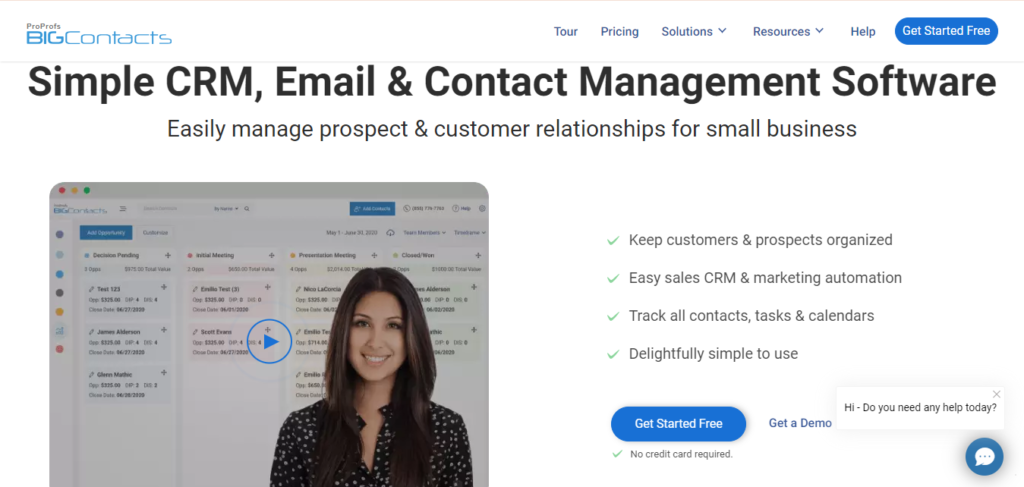
Key Features
- Contact Management: With BIGContacts’ powerful contact management features, e-commerce companies can arrange and monitor client data, such as contact details, past purchases, and interactions.
- Integration possibilities: BIGContacts has possibilities for integration with e-commerce platforms and other business applications, enabling process automation and data synchronization, even though its connectivity ecosystem may not be as comprehensive as that of some other CRMs.
- Sales Pipeline Management: With the CRM platform’s tools for managing sales pipelines, e-commerce companies can efficiently track deals, rank leads, and project sales.
- Email Marketing: With BIGContacts’ basic email marketing features, e-commerce companies may send newsletters, promotional emails, and follow up communications to customers and leads.
- Customization: E-commerce companies can customize BIGContacts’ fields, styles, and workflows to fit their unique requirements and workflows.
Pros and cons
| Pros | Cons |
| BIGContact can be used by users with different degrees of technological proficiency. | Compared to other CRM solutions, BIGContacts might offer fewer integration possibilities which could mean that manual data entry or other tools are needed. |
| BIGContacts’ customization features which include custom fields and tags, let companies adapt the CRM to their own e-commerce requirements. | BIGContacts can not provide the scalability and capabilities needed by larger organizations. |
| It offers strong contact management capabilities that help e-commerce companies efficiently arrange and monitor client interactions. | It might not include all of the CRM features found in more all-inclusive solutions such as workflow automation, extensive reporting, and marketing automation. |
| BIGContacts offers prompt customer service including phone support and email support to assist users with any problems or inquiries. | Compared to other CRM options, BIGContacts can have a smaller user base, which could affect the availability of community assistance and third-party connectors. |
| Because of its affordable price plans and simple pricing structure, it is suitable for small and medium-sized e-commerce enterprises with tight budgets. | The usability of BIGContacts’ mobile app for sales teams who are constantly on the go may be impacted by certain user-reported constraints such as fewer functionality and less user-friendly navigation when compared to the desktop version. |
Price: Starts at $9.99 per month.
10 Factors to Consider When Choosing CRM for ecommerce
There are a number of important considerations to take into account when choosing CRM (Customer Relationship Management) software for an online store.
1. Integration Compatibility:
Verify that the CRM works easily with your marketing tools, accounting software, e-commerce platform, and any other vital systems you utilize.
2. Customization Options:
To ensure that the CRM system meets your unique business requirements, look for features that allow customization. Custom fields, workflows, and reporting tools that fit your e-commerce procedures are all part of this.
3. Scalability:
Select a CRM program that can expand along with your company. Your CRM should be able to handle growing data quantities, user counts, and functionality needs as your e-commerce firm grows.
4. User Interface and Ease of Use:
Choose a CRM system that is simple for your staff to use and navigate.
5. Data Security and Compliance:
Verify that the CRM program conforms with laws governing data protection such as the CCPA or GDPR. It should have facilities for data backup and recovery in addition to strong security measures to safeguard private client information.
6. Automation Capabilities:
Select a CRM that provides powerful automation tools to increase effectiveness and output. To optimize repetitive processes like email marketing, lead nurturing, and customer care, e-commerce enterprises need automation.
7. Mobile Accessibility:
Having a CRM with mobile access is essentially most important. Seek for a solution that enables your staff to view and update client data while on the move with mobile apps or responsive online interfaces.
8. Customer Support and Training:
Take into account the CRM provider’s degree of customer support and training.
9. Analytics and Reporting:
To analyze important data, keep an eye on sales trends, and pinpoint areas for development, pick a CRM that has extensive analytics and reporting capabilities.
10. Cost and ROI:
Calculate the overall cost of ownership, taking into account setup fees up front, ongoing subscription fees, and any supplementary expenditures like integration or customization fees. Assess the features and advantages provided by several CRM platforms to ascertain which one best suits your e-commerce enterprise.
Implementation Tips
You may improve customer satisfaction and process efficiency in your e-commerce business by integrating Customer Relationship Management (CRM) software.
Some useful techniques for putting CRM software to good use are
Define Your Objectives: Specify exactly what you hope to achieve by using CRM software. Are you trying to boost sales, sharpen your marketing, or provide better customer service?
Select the Appropriate CRM Software: Choose a CRM system that fits both your budget and your company’s requirements.
Connect with an E-commerce Platform: Make sure that your e-commerce platform and CRM applications integrate seamlessly.
Train Your Team: Educate all members of your team on the ins and outs of using the CRM software.
Customize to Fit Your Business: Adapt the CRM program to the unique workflows and business processes that you have.
Pay Attention to Data Quality: Ensure that the CRM system contains correct and current customer data. Maintain the integrity of your data by regularly cleaning and validating it.
Implement Lead Management Processes: To efficiently track and nurture leads throughout the sales cycle, create standardized lead management procedures inside the CRM system.
Utilize Marketing Automation: Deliver targeted and customized marketing communications by segmenting your consumer base according to their demographics, past purchases, and behaviors.
Monitor and Analyze Performance: Make use of your CRM software’s reporting and analytics features to keep an eye on important performance indicators including lifetime value, client acquisition, and retention.
Continuously Improve: The process of implementing CRM is never-ending. To adjust to shifting market conditions and business needs, get input from users and stakeholders. You should also analyze and improve your CRM strategy on a regular basis.
Final words:
Selecting the best CRM software is essential for fostering customer relationships and promoting business growth in the dynamic world of e-commerce. The nine CRM options discussed in this article each have unique advantages and satisfy a range of requirements and tastes. These platforms enable e-commerce companies of all sizes to optimize operations and provide customized consumer experiences through the provision of strong automation tools and seamless integration capabilities.
There is a CRM solution to meet every need, regardless of whether scalability, usability, or sophisticated analytics are prioritized. Ecommerce business owners can measure client interactions, manage prospects, and develop enduring brand loyalty by utilizing the power of these CRM solutions. Investing in the appropriate CRM software is not only advantageous but also necessary to stay ahead of the curve and promote long-term success in the highly competitive world of online retail.
FAQ’s
How can I choose which CRM is most appropriate for my online store?
Think about things like your company’s size, spending limit, unique requirements (such as automation and integration), and scalability.
What is the price of CRM software, and are there any additional costs that should be considered?
The cost of CRM software varies significantly based on functionality, customer volume, and other services provided. It’s important to carefully evaluate price plans because some may have hidden fees for adding-ons or exceeding usage restrictions.
Can CRM software assist with marketing and sales initiatives in addition to maintaining client relationships?
The majority of CRM programs provide functionality beyond connection management. To assist many facets of e-commerce operations, many incorporate analytics, sales pipeline management, and marketing automation solutions.
Can loyalty programs and client retention be aided by CRM software?
Indeed, CRM software keeps track of consumer interactions, past purchases, and preferences. This helps e-commerce companies to offer customized specials, individualized marketing campaigns, and loyalty plans to keep customers coming back.
Can e-commerce companies use CRM software to analyze client data and make better decisions?
Indeed, robust analytics capabilities that offer insights into customer behavior, purchase trends, and campaign performance are frequently included in CRM software. These tools enable firms to make data-driven decisions that optimize marketing tactics and enhance customer happiness
To what extent is customer data protected by CRM software?
Data security is a top priority for reputable CRM providers, who put safeguards in place including encryption, access limits, and frequent security audits to guard against breaches or unwanted access to critical client data.


